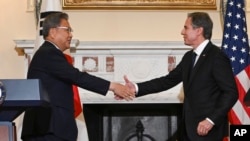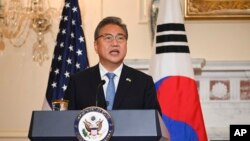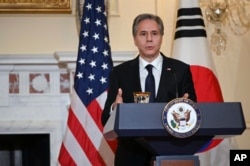The United States and South Korea are preparing for all contingencies of North Korea's imminent nuclear test, but President Joe Biden's administration is facing tough questions from congressional members and analysts on the diplomatic impasse and inability to deter North Korea from further provocation.
Monday, U.S. Secretary of State Antony Blinken held talks with South Korean Foreign Minister Park Jin at the State Department. The two discussed a "unified and firm" response to North Korea's unprecedented number of ballistic missile tests and nuclear threats. This year, North Korea has launched 31 ballistic missiles, smashing a previous record of 25 set in 2019.
Park said he believed North Korea has finished the preparation for the next nuclear test and now requires only a "political decision." It would be Pyongyang's seventh nuclear test since 2006 and its first since September 2017.
"If North Korea ventures into another nuclear test, I think it will only strengthen our deterrence and also international sanctions, and it will only isolate North Korea from the international community," Park told reporters during his first visit to Washington as South Korea's top diplomat.
"We are prepared to make both short- and longer-term adjustments to our military posture as appropriate," Blinken said during a joint news conference. The top U.S. diplomat added that both countries are talking about how to "expand the scope and scale of combined military exercises" as well as "training on and around the Korean Peninsula."
An "extended deterrence" working group between the U.S. and South Korea will be reestablished and "get up and working very soon in the weeks ahead," said Blinken.
Diplomatic impasse
On Saturday, North Korean state media announced the appointment of Choe Son Hui as the country's first female foreign minister and one of the highest-ranking women officials in its history. It is unclear whether Choe's promotion indicates a wider shift in North Korea's approach toward the U.S. and South Korea.
"We have noted the appointment of a new foreign minister in North Korea, but our approach is not predicated or dependent on specific individuals. It's focused entirely on the policies that a given country is pursuing," Blinken said in response to questions from VOA.
The Biden administration seeks dialogues with Pyongyang without preconditions and has reached out to North Korea, officially the Democratic People's Republic of Korea (DPRK) on specific proposals, either through third parties or through private channels including personal messages from senior U.S. officials to senior DPRK officials, according to Sung Kim, U.S. Special Representative to DPRK.
North Korea has not responded nor indicated that it is interested in diplomatic talks.
"It's time for preventive diplomacy," said Yoon Young-kwan, South Korea's former minister of foreign affairs and now professor emeritus at Seoul National University. He made the comment during a webinar hosted by the Washington-based think tank Center for Strategic and International Studies (CSIS.)
"I would like to recommend the Biden administration to seriously consider dispatching a special high-level (as a one-off engagement) envoy to North Korea" to "mediate the crisis situation and to begin dialogue," Yoon added, suggesting a modification to the current approach of the Biden administration in which Sung Kim serves as both U.S. ambassador to Indonesia and as special envoy for North Korean issues.
Congressional critics
While the Biden administration underlined North Korea's continuing expansion of "illicit nuclear weapons and missile programs" as one of the major challenges facing the Indo-Pacific region and vowed to strengthen "extended deterrence" on North Korea's provocations, some members of Congress are skeptical about the State Department's seriousness to prioritize its Indo-Pacific strategy.
"Despite the administration's rhetoric, the budget requests for the East Asia and Pacific (EAP) Bureau and South and Central Asia (SCA) Bureau rank at the very bottom when … compared to the State Department's other regional bureaus … In total, these two bureaus covering the Indo Pacific Region account for only 11% of the total foreign assistance budget," said Republican Rep. Steve Chabot, the ranking member of the House Foreign Affairs Subcommittee on Asia, the Pacific, Central Asia, and Nonproliferation, during a hearing June 7.
"The administration has requested less personnel and less diplomatic program funding for EAP and SCA (Bureaus) combined than it has for the European Bureau alone," Chabot added.
Others raised concerns that nongovernmental organizations seeking to provide humanitarian aid to North Korea may not be able to under current sanctions, particularly at a time of the COVID-19 outbreak.
"Whatever the regime does next, we can expect the people of North Korea to suffer under harsher conditions, as they're further cut off from essential food and medicine," said Democratic Rep. Andy Levin during the hearing last week.
Former U.S. officials and some experts noted that North Korea did not feature as prominently in Biden's summit meeting with South Korean President Yoon Suk Yeol last month.
"Normally when we see a summit meeting between the U.S. and the South Korean president, particularly a first summit meeting, the featured item always is North Korea," said Victor Cha, a senior vice president and Korea chair at CSIS who led negotiations with North Korea under former President George W. Bush's administration.
"President Biden arrived in Korea, and the first place he went was not the DMZ (the Demilitarized Zone separating the two Koreas) or not the intense discussions on North Korea but went to the Samsung plant in Pyeongtaek," Cha said in a recent CSIS webinar.
Some analysts said the U.S. is running out of options.
"Sanctions so far have not changed the North's (North Korea's) policies and aren't likely to have any greater impact now," Doug Bandow, a senior fellow at the Cato Institute, told VOA's Korean Service.
Suzanne DiMaggio, a senior fellow at the Carnegie Endowment for International Peace, said, "Now it appears we're about to enter a fraught period, and U.S. options are limited at best."
Bill Gallo and Christy Lee contributed to this report.








